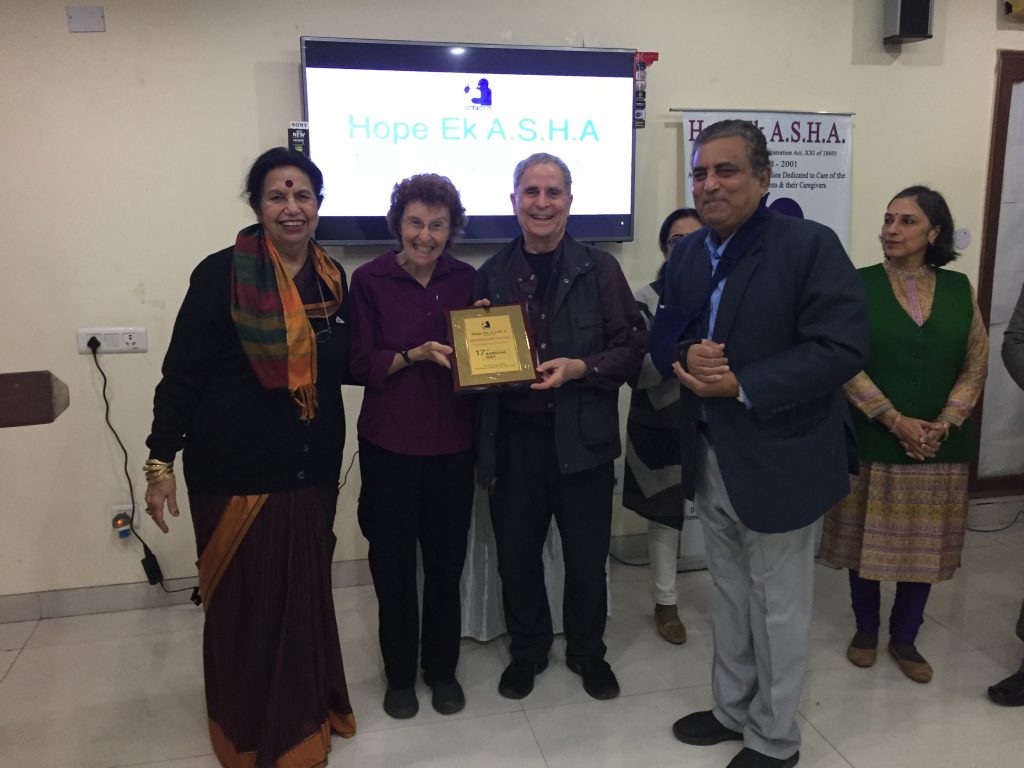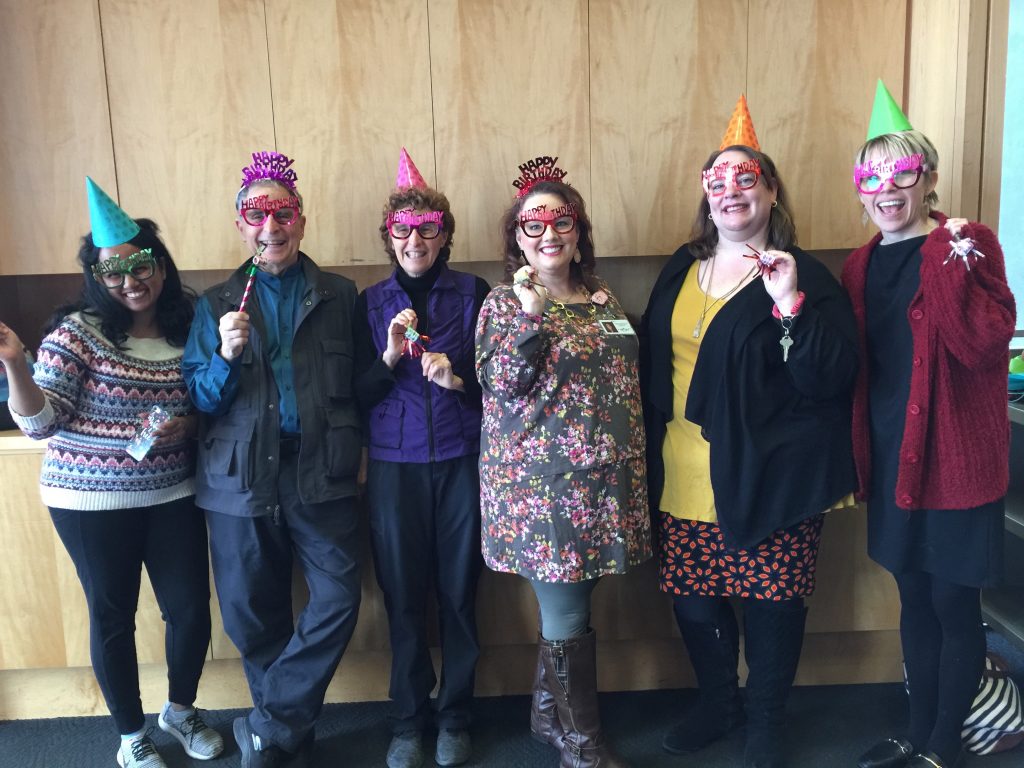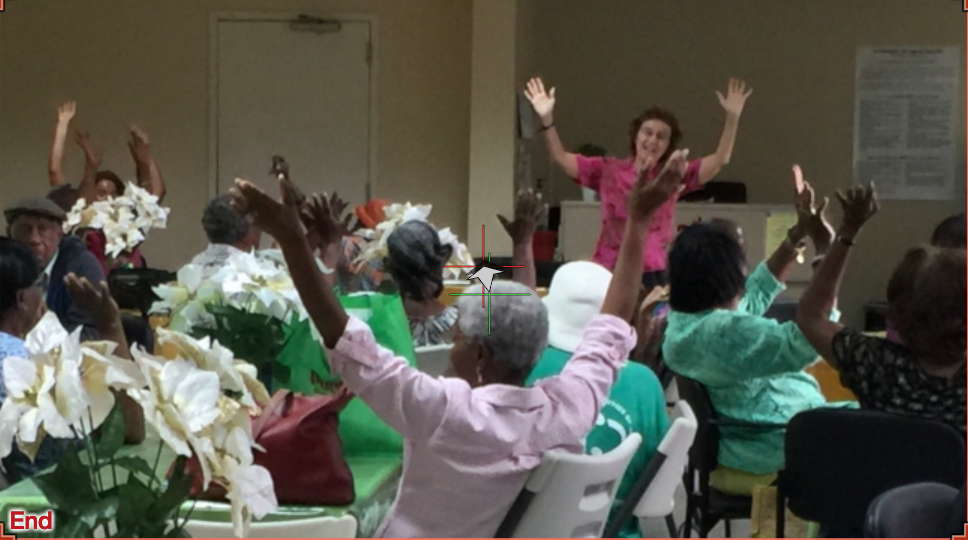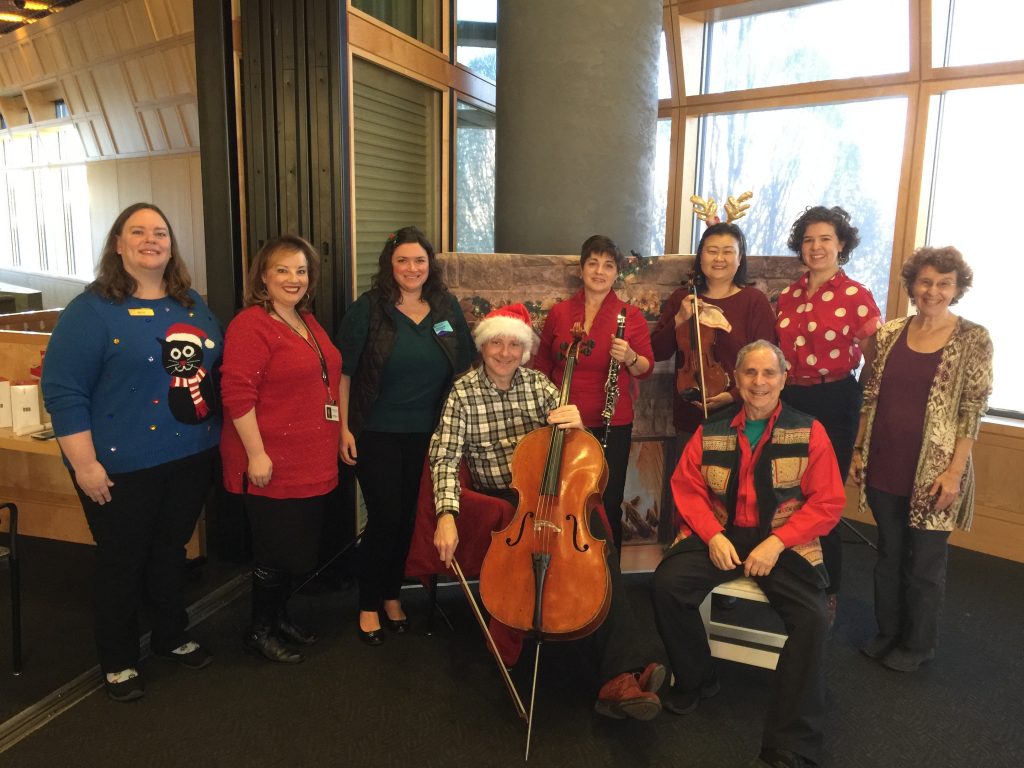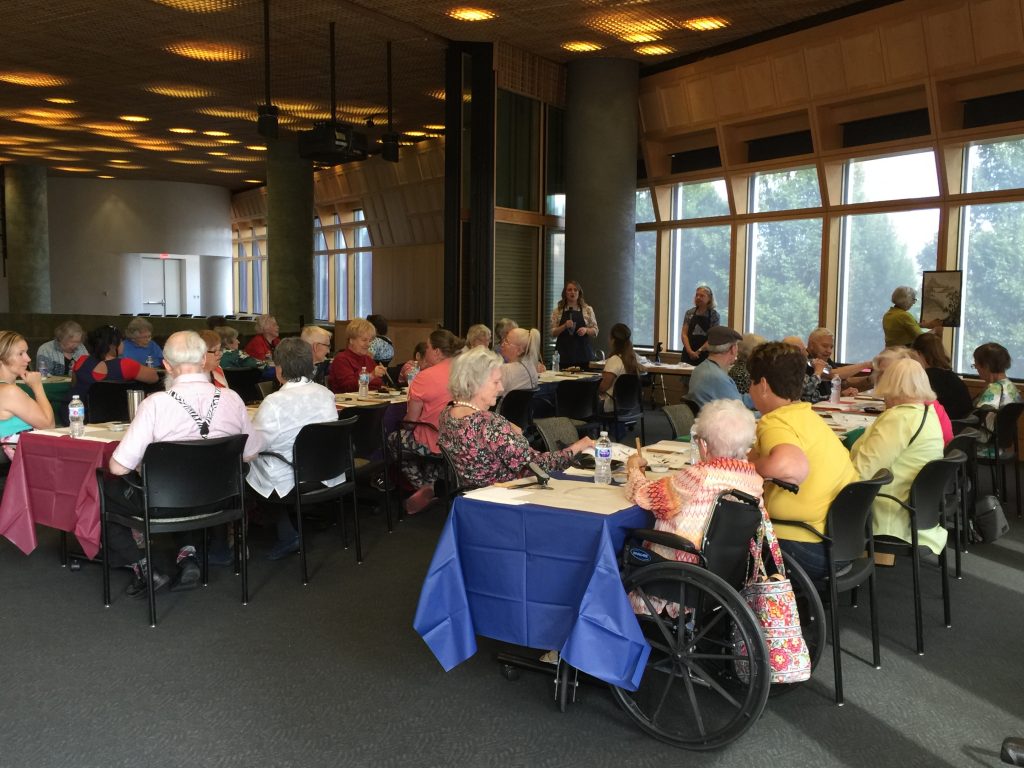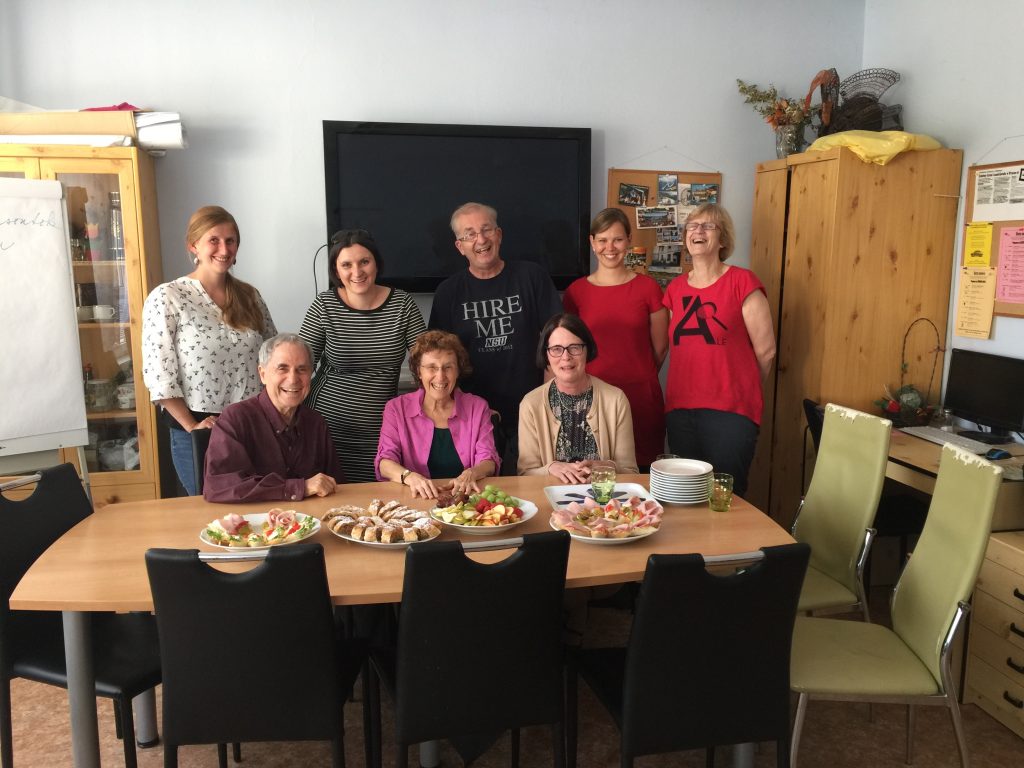Posts Tagged ‘Dementia friendly activities’
Free events for people living with dementia and their care partners
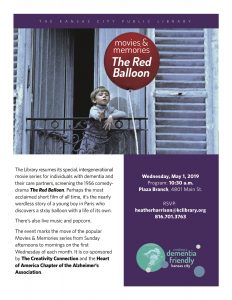
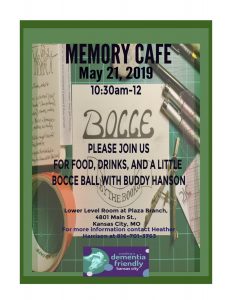
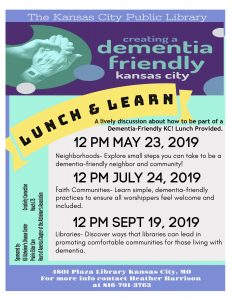
Coming Together to Ignite Hope: Working with Dr. Chawla in New Delhi, India
Our Uber driver in New Delhi was a turbaned Sikh with a long gray beard. A sign hanging from the rear view mirror proclaimed, “This car respects women.” He deftly drove us through the city, navigating the melee wherein four lanes of cars compete in a two-lane space. Inside the NGO, Hope Ek A.S.H.A., the receptionist led us into Dr. Chawla’s office. Dr. Chawla has a rich voice and a magnetic presence. She is the catalyst for this center for caregivers, creating the service because of her own experience with her mother and Alzheimer’s. We were coming together to ignite hope.
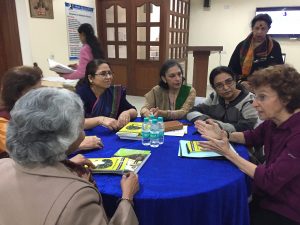
“We know how hard it is for the caregivers,” she says. She and her team help caregivers throughout New Delhi and indeed, throughout the world, educating them, visiting with them and their loved ones who are living with dementia, facilitating support groups, sharing stories and ideas, offering respite and financial support as possible.
For this event, she has gathered a group of doctors, caregivers, support staff, and more. First, some of her team show us activities they do with clients who are living with dementia. These include chanting, deep breathing, gentle stretching, tapping (EFT- Emotional Freedom Techniques), and a lovely heart opening exercise that affirms “We are healthy, we are happy.” They show us painting and games that strengthen memory.
Join us for these interesting exercises:
Then a caregiver from Mumbai Skypes in. Her voice is sad and her face is drawn and pale. She wipes at her eyes as she discusses her issues with her father. Instantly, one of our caregivers steps forward to offer advice. I share ideas with her as well. Then Dr. Sahi, leader of the New Delhi Laughter Academy, guides us in laughter exercises. Within minutes, we are all laughing, even our friend from Mumbai. When the session ends, the worn and weary caregiver has been transformed into an energetic and renewed woman, one who believes there is hope.
That’s is one of the reasons we all came together: our mutual hope and our belief that everyone needs support and a sense of community and purpose.
Experience our New Delhi caregiver’s event by watching this video:
Deborah Shouse is the author of Connecting in the Land of Dementia: Creative Activities to Explore Together and Love in the Land of Dementia: Finding Hope in the Caregiver’s Journey.
Rock Around the Library: Celebrating a Year of KC Memory Cafes
No one can sit still. Not when Little Richard, The Archies, or Dion are singing. It’s a Rock Around the Library: Celebrating a Year of the KC Memory Cafes. We are one-year-old this March and we’re celebrating with Musical Bingo by Carrieoke Productions. We’ve enjoyed ice cream and cake and we’re ready to roll, rock and roll, that is.
At the first note, one of our guest says, “Sugar, Sugar.” She’s right and a small group of us sings the literally saccharine 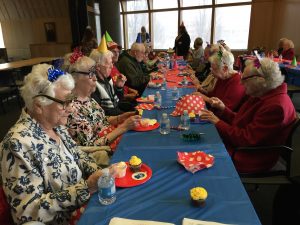 lyrics, “Sugar, ahh honey, honey, you are my candy girl…”
lyrics, “Sugar, ahh honey, honey, you are my candy girl…”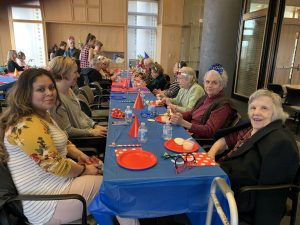
Within moments, all the care partners are dancing. We’re all helping each other find the songs on our Bingo sheets. We’re singing along when we know the lyrics and humming along when we don’t. We’re laughing.
When Carrie plays the Beach Boys’ tune, I Get Around, one guest says, “I wish I could get around.” Another chimes in, “Me too!”
For an hour, we Twist and Shout, warble Do You Want to Dance?, warn our neighbors not to “step on my Blue Suede Shoes,” and shake our heads over Run Around Sue. Those who win at musical bingo, and there are many of them, get to select a prize. 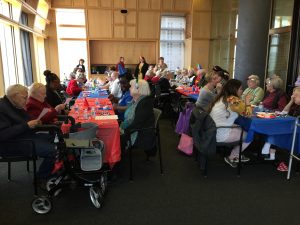
“It’s wonderful to see people blooming,” one care professional says.
And it’s equally wonderful to see the caregivers laughing, joking, dancing, encouraging, sharing, and helping us create This Magic Moment.
Click here to join the party:
Don’t miss our Magic Moment in April. The Kansas City Zoo is bringing some exotic and personable animals on April 16th.
Please join us at 10:30 on the lower level of the Plaza Library. Come early. Please share this information with anyone who might benefit.
Deborah Shouse is the author of Connecting in the Land of Dementia: Creative Activities to Explore Together and Love in the Land of Dementia: Finding Hope in the Caregiver’s Journey.
Laughing for Health and Happiness in St. Thomas
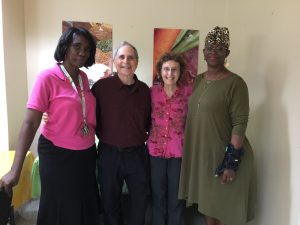 The people of St. Thomas have been through a lot and many are still recovering from Hurricane Maria. But despite the hardships, they were ready to laugh for health and happiness. We were delighted to be working with our friend Arleen Evans O’Reilly, Director of the Family Caregiver Support Program, offering a laughter yoga class in St. Thomas. We met at the senior center and had a wonderful time facilitating laughter with seniors, caregivers, and people who are living with dementia. CLICK HERE to experience a glimpse of our session.
The people of St. Thomas have been through a lot and many are still recovering from Hurricane Maria. But despite the hardships, they were ready to laugh for health and happiness. We were delighted to be working with our friend Arleen Evans O’Reilly, Director of the Family Caregiver Support Program, offering a laughter yoga class in St. Thomas. We met at the senior center and had a wonderful time facilitating laughter with seniors, caregivers, and people who are living with dementia. CLICK HERE to experience a glimpse of our session.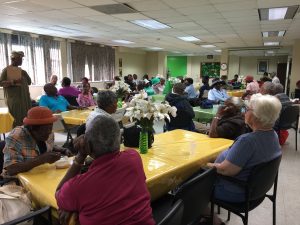
We have been experimenting with making our laughter sessions increasingly interactive. We invited our attendees to suggest ingredients for the stew and it included chicken, pumpkin, onions, carrots, potatoes, and bullion. After we added and stirred, we tasted and it was both delicious and “funny” tasting.
For our milkshake, we first asked people what ice cream they want to use. We had a lot of chocolate lovers. A few enjoyed vanilla and strawberry. We also had fans of praline cream, banana, and cherry Garcia. We held an imaginary container in one hand and we poured milk with the other hand and and said, “Ha ha ha.” After doing that three times, we scooped in our ice cream three times, adding in laughter syllables. Then, with both hands, we shook and laughed. Finally, we tasted and enjoyed a good giggle.
Ron and I continue to explore ways to add more laughter into our every day lives. The benefits of sustained intentional laughter include reducing stress, lowering blood pressure, boosting the immune system, increasing oxygen to the brain, creating a sense of connection and community, and increasing feelings of happiness. Plus, laughter offers us aerobic exercise.
Here are some of the way we’re adding extra laughter into the day:
- Laughing while we exercise. Squats are much more fun when you’re giggling as you do them.
- Adding laughter activities in while we walk.
- Singing “Ha Ha” syllables to favorite tunes. Even a simple, Row Row Row Your Boat, with Ha ha syllables, makes us laugh.
- Looking at the clock and deciding, “We’re going to laugh for one minute.”
We often visit Robert Rivest’s site for short ten-minute laughter videos, which cheer us onward. Laughteryoga.org offers more great resources. And we have fun creating our own laughter activities. If you have laughing ideas you want to share, we’d love to hear from you.
Deborah Shouse is the author of Connecting in the Land of Dementia: Creative Activities to Explore Together and Love in the Land of Dementia: Finding Hope in the Caregiver’s Journey.
Art Invites Conversation
Teri Miller, with the Alzheimer’s Association Houston & Southeast Texas Chapter, has witnessed the power of how art invites conversation. As the Early Stage Program Manager, Teri collaborates with a variety of Houston’s arts and civic organizations.
“Going to cultural activities offers people a sense of normalcy and gives them a date to put on their calendars,” Teri says. “When they go with friends or care partners, they have an experience to discuss. Even people who say, ‘Oh, I don’t care for museums,’ usually have a great time.”
Sam is an example of someone who was surprised to enjoy the art gallery.
He attended one of Teri’s early stage support groups. His wife, who cared for him at home, went to the care partner’s group. Teri formed a partnership with the Houston Museum of Fine Arts and invited her early stage group to experience a tour. When he heard the invitation, Sam rolled his eyes and said, “I’ve never been to a museum and I’m not about to start now.”
But the next week, Sam signed up for the tour.
“What made you change your mind?” Teri asked.
“My wife really wanted to go. She does so much for me, I figured I’d do something for her.”
Teri expected Sam to sit back silently, arms folded over his chest, as the docent asked, “What does this painting make you think of? Has anyone ever been in a similar setting?” But to Teri’s surprise, Sam had opinions on each of the three pieces they discussed.
Sam told Teri, “At first, I didn’t want to go because I was worried I wouldn’t have anything meaningful to contribute. But I guess you don’t have to know anything about art to enjoy the museum.”
He and his wife talked about the experience all the way home. Discussing the paintings opened up chances to reminisce and connect. Plus the experience gave them something interesting to share with their grown children and visiting neighbors.
Like many art partnerships around the country, Teri was inspired by MOMA’s Meet Me art program for people living with dementia. The Houston museum benefitted from MOMA coming to train their docents. The program offers comprehensive guidelines for visiting a museum or viewing art at home.
Creative Sparks:
Many art galleries and museums offer special tours and events for people living with dementia. If you’re lucky enough to have such a tour available, take advantage of it.
To design your own museum tour:
- Think of a museum your partner likes. If feasible, buy postcards of some of their art or visit their on-line gallery together and ask your partner which pieces he prefers. That way, you can tailor the visit to his taste.
- Choose one or two rooms that feature his preferred art. Make sure one room has a place to sit.
- Use the paintings and sculptures as a catalyst for conversation. Ask open-ended questions, discussing the colors, people, and objects you both notice.
- If the museum has a restaurant or tearoom, treat yourselves to something delicious.
- Enjoy the sense of connection that comes from discussing art; there are no right or wrong answers, just interesting observations.
- To fashion a viewing experience at home:
- Select art books from the library or use your own personal collection.
- Choose works that portray emotion, tell a story or align with your partner’s background or interests.
- Ask open-ended questions that invite conversation, such as, “What does this make you think of?” and “What do you notice in this picture?” Have fun imagining what the people in the painting are thinking. Imagine their professions and whether they’re happy.
This is an excerpt from Connecting in the Land of Dementia: Creative Activities to Explore Together. Deborah also wrote Love in the Land of Dementia: Finding Hope in the Caregiver’s Journey.
Share Your Creative Arts Endeavors: An Opportunity for People who are Living with Dementia
I am honored to be part of the Arts Work Group at the Dementia Action Alliance, which is one of my favorite non-profits. Please share this information with those who might benefit. Warmly, Deborah
Dementia Action AllianceDementia Arts Fest 2019
Mike Belleville, 2018
The Dementia Arts Fest celebrates art made by persons living with dementia!
Call for Entries Deadline March 15, 2019
If you are a person living with dementia who engages in creative projects or you’re the leader of a creativity program for people living with dementia, we want to hear from you! You are invited to submit up to 3 pieces of art, ready to display – It’s an easy process to submit. This is what we need:
1. Photos of the artwork in JPEG, PDF, or PNG format. Label each image with your last name, the title.
2. A separate page:
Your name (artist’s name) and contact information.
List of your work with titles, dimensions, and media
3. Write down a brief description about how creating art impacts you and makes you feel. (around 200 words)
5. Email the above information to Karen Love at karenlove4@verizon.net.
Please let us know if you are submitting artwork on behalf of someone else.
Sale of Artwork
▪ Artwork accepted for the exhibition may be for sale, or may be marked as ‘NFS’ (not for sale). If the artwork is NFS, artists must include a prepaid return shipment label for UPS or Federal Express with their artwork shipment.
▪ If the artist’s work is sold, the Dementia Action Alliance [a 501(c)(3) charity] will receive 50% of the retail price set by the artist as a contribution.About the Dementia Action AllianceThe Dementia Action Alliance is a national non-profit organization of people living with dementia, care partners, dementia specialists and others making our nation a better place in which to live with dementia. www.daanow.org
Deborah Shouse is the author of Connecting in the Land of Dementia: Creative Activities to Explore Together and Love in the Land of Dementia: Finding Hope in the Caregiver’s Journey.
Santa and the Symphony Visit the KC Memory Cafe
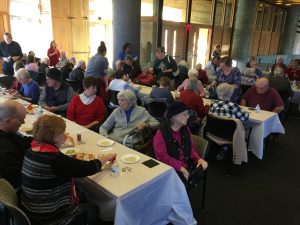 At our December Memory Cafe, Santa had an amazing pre-show- warm-up band: a trio from the Kansas City Symphony. Their renditions of familiar holiday tunes were musical works of art, filled with melodic flourishes and surprises. Our guests listened avidly. When Stephanie Brimhall, the Symphony’s Education Manager, led us in a singalong, everyone raised their voices and sang with heart and gusto. As our attendees finished decorating Christmas cookies with colorful icings, bright sprinkles, and little chunks of peppermint, we heard a jingling of bells and a booming, “Ho Ho Ho.” Santa had arrived, with a sack of treats.
At our December Memory Cafe, Santa had an amazing pre-show- warm-up band: a trio from the Kansas City Symphony. Their renditions of familiar holiday tunes were musical works of art, filled with melodic flourishes and surprises. Our guests listened avidly. When Stephanie Brimhall, the Symphony’s Education Manager, led us in a singalong, everyone raised their voices and sang with heart and gusto. As our attendees finished decorating Christmas cookies with colorful icings, bright sprinkles, and little chunks of peppermint, we heard a jingling of bells and a booming, “Ho Ho Ho.” Santa had arrived, with a sack of treats.
“How many of you have been good?” Santa asked and most of us raised our hands. Santa made the rounds, passing out sweet treats, courtesy of Russell Stover Chocolates, and wishing everyone a merry holiday. 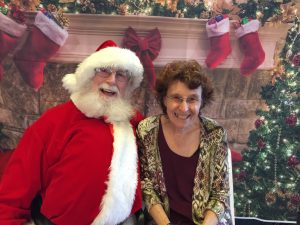 Then he settled into a comfortable chair beside the backdrop of a scenic hearth. We all lined up to sit beside him and have our photos taken with the Great Claus. Santa warmly welcomed each person and everyone was just thrilled to be near him — and even more thrilled when Jennifer Walker’s remarkable little printer produced a wonderful photographic memento of the event.
Then he settled into a comfortable chair beside the backdrop of a scenic hearth. We all lined up to sit beside him and have our photos taken with the Great Claus. Santa warmly welcomed each person and everyone was just thrilled to be near him — and even more thrilled when Jennifer Walker’s remarkable little printer produced a wonderful photographic memento of the event.
At the end, Santa summed up the holiday spirit by sharing this message: “Peace for the world and good will for all people.”
We hope we can all continue this spirit of hope, sharing, and generosity throughout the new year.
Capture the cafe spirit for yourself by clicking on this short video:
Deborah Shouse is the author of Connecting in the Land of Dementia: Creative Activities to Explore Together and Love in the Land of Dementia: Finding Hope in the Caregiver’s Journey.
Eight Steps to Help People Living with Dementia Feel at Ease during Holiday Gatherings
As we move into the holiday season, Ron and I think often of our parents who went through their last holidays with dementia: my mom Frances and his father Frank. We wanted to share the season with them in ways that felt safe, comfortable, and honoring so we gradually developed these tips. Recently, we shared the tips via email and had such a great response we also want to share them with you.
Several people wrote, “These ideas are good for anyone, not just those with memory loss.”
What great wisdom–to treat each person with the tenderness and consideration that we often reserve for someone going through a physical or emotional illness.
We’d like to share our tips and we’d like to learn from you: what other suggestions do you have for helping people feel connected at gatherings?
Eight Steps to Help People Living with Dementia Feel at Ease during Holiday Gatherings
- When you’re in a group, help the person living with dementia feel safe and comfortable by having a trusted friend or family member stay beside him or her, explaining the proceedings and fielding questions from others, as needed.
- Encourage people to say their name and maintain eye contact when conversing with the person who is living with dementia.
- Make sure the person can come and go from the group as needed. Create a quiet space where he or she can rest — or appoint a caring person to drive your loved one home when he tires of the festivities.
- Have something special for them to look at, like a family photo album or a favorite magazine.
- Choose background music that is familiar to them, music of their era played in a style they resonate with.
- Prepare a few of their favorite foods.
- When talking to them, don’t correct or contradict or try to pull them into the current reality. Simply listen carefully and let them talk.
- Appreciate them for who they are right now.
Here’s to a holiday season filled with grace, gratitude and generosity.
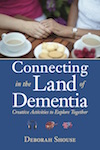
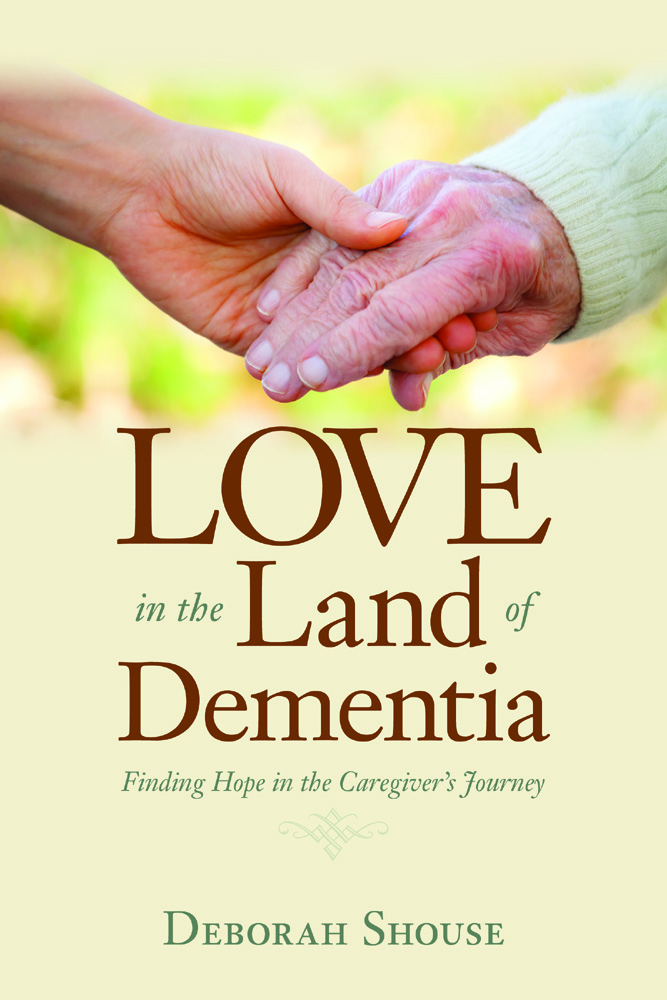
Deborah Shouse is the author of Love in the Land of Dementia: Finding Hope in the Caregiver’s Journey.
Dementia Arts to Draw us Together
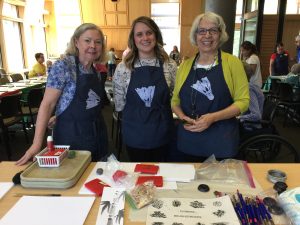 September’s Memory Cafe featured a lively team of educators from the Nelson-Atkins Museum of Art. Using the arts to draw us together, they showed us the Chinese art form of painting pictures of bamboo. About fifty of us gathered in the the library’s spacious lower level. Colorful plastic cloths covered our tables, making it easy to distinguish our drawing paper and painting supplies.
September’s Memory Cafe featured a lively team of educators from the Nelson-Atkins Museum of Art. Using the arts to draw us together, they showed us the Chinese art form of painting pictures of bamboo. About fifty of us gathered in the the library’s spacious lower level. Colorful plastic cloths covered our tables, making it easy to distinguish our drawing paper and painting supplies. 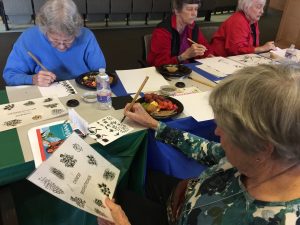 All of us eagerly dipped our special bamboo brushes into the ebony paint and made short pushing movements, replicating segments of the plant’s stalk. Then our educators showed us drawings of bamboo foliage and we experimented with wispy thin lines of leaves.
All of us eagerly dipped our special bamboo brushes into the ebony paint and made short pushing movements, replicating segments of the plant’s stalk. Then our educators showed us drawings of bamboo foliage and we experimented with wispy thin lines of leaves.
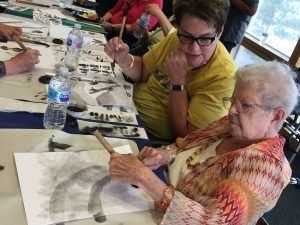 Our common ground continued as our teacher said, “Now, we’re going to pass out large sheets of paper.” We all oohed and aahed and let our strokes grow larger and more confident. At the end, each person created a design in a small wedge of clay, pressed the clay into a red stamp pad, and adorned the painting with our own personal “signature.”
Our common ground continued as our teacher said, “Now, we’re going to pass out large sheets of paper.” We all oohed and aahed and let our strokes grow larger and more confident. At the end, each person created a design in a small wedge of clay, pressed the clay into a red stamp pad, and adorned the painting with our own personal “signature.”• To add extra meaning, connect the artistic activity with something in your partner’s past.
• Invite an intergenerational mixture of artists, from children, grandchildren, art students, and volunteers to join your partner and add encouragement. 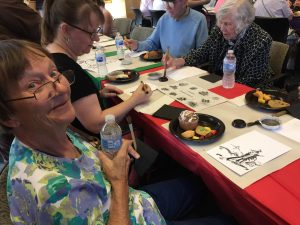
• Create a variety of art-related activities, including visiting galleries or looking at pictures from magazines, as well as painting, drawing or various media.


Czech Mates in Dementia Care: Laughter Yoga in Prague
The table was spread with an array of Czech delicacies: apple strudel, special sandwiches with flowers of ham atop fresh baguettes, a bountiful tray of strawberries, grapes, and apple slices. 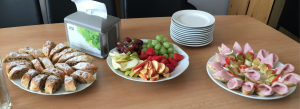
“This is the way we welcome people here in Prague,” said Lucie Hajkova, social worker and coordinator of respite care for the Czech Alzheimer’s Society.
Ron and I were visiting the Gerontological Centre and the Czech Alzheimer’s Society, which are both housed in the same building. The two organizations work together to offer clients everything they need, from psychological counseling, to memory testing, to social work services, to healthcare. We came to learn and to present a laughter yoga session.
We gathered with staff members around the table to learn about the center, which was started in 1997 by Iva 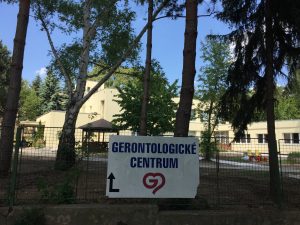 Holmerova, MD. along with Hana Janeckova, PhD. Hana was putting together training materials for caregivers when she was contacted by Alzheimer’s Disease International. They wanted to know more about her work and they invited her to an international conference in Jerusalem. That conference was a turning point. Hana left it inspired and determined to help Czech families that were dealing with dementia. She contacted Iva and both saw the need to offer education, diagnosis, support, and care for people living with dementia and their families in the Czech Republic. Today, both centers are flourishing.
Holmerova, MD. along with Hana Janeckova, PhD. Hana was putting together training materials for caregivers when she was contacted by Alzheimer’s Disease International. They wanted to know more about her work and they invited her to an international conference in Jerusalem. That conference was a turning point. Hana left it inspired and determined to help Czech families that were dealing with dementia. She contacted Iva and both saw the need to offer education, diagnosis, support, and care for people living with dementia and their families in the Czech Republic. Today, both centers are flourishing.
We were impressed with the dementia services they offered, which included home care for people who need help with bathing, dressing, eating, exercise or more. The building holds a respite center. When families need renewal time, or when people living with dementia need extra care or healing time, they can stay in respite for up to a month. The Centre also hosts a day program that offers a variety of activities in a homey and comfortable setting,
Even more impressive than the Society’s services were its staff. Each had a passion for this work, a love for those who are living with dementia, and a compassion for their families.
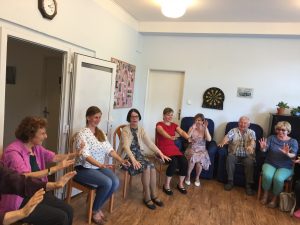
We had a wonderful time sharing a laughing session at the day center—our first international facilitation. We sat in a beautiful circle of people living with dementia, staff, family, and friends. We couldn’t have done it without our translator, Eliska, who captured the energy and essence of what we were saying. And once we all started laughing, we were beyond the constraints of language. Click here to experience a bit of laughter in Prague.
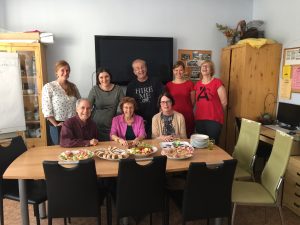
Photo Caption:
Eliska Brouckova, psychologist, consultant/advisor for people with dementia and their care givers
Martina Matlova, Director
Petr Veleta, PhD, dancer, dance therapist
Marketa Splichalova, psychologist, consultant/advisor for people with dementia and their care givers
Eva Jarolimova, PhD, psychologist, consultant for people with dementia and their care givers
Hana Janeckova, PhD, co- founder of the Czech Alzheimer Society, head of governing board of Czech Alzheimer Society, University teacher, researcher
Lucie Hajkova, social worker, coordinator of respite care in homes of people with dementia.




